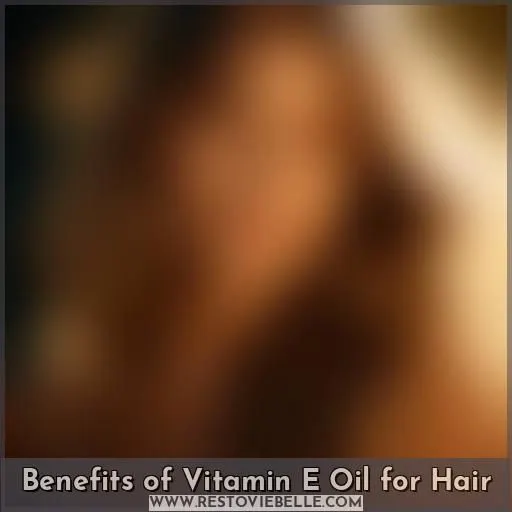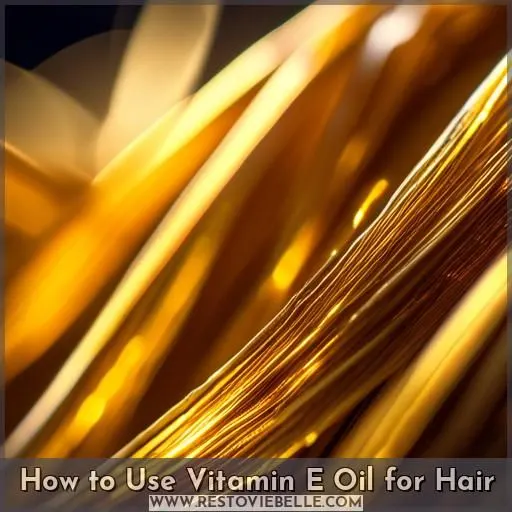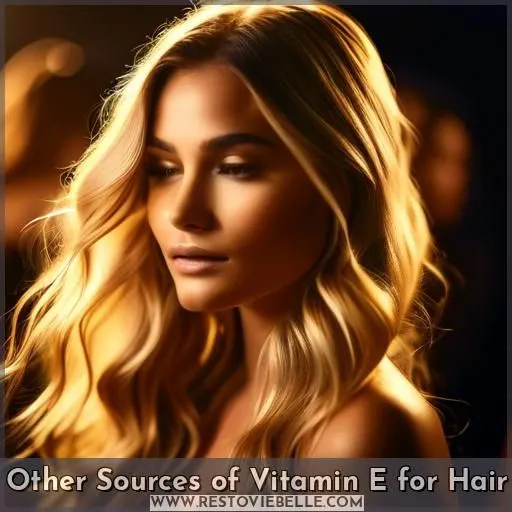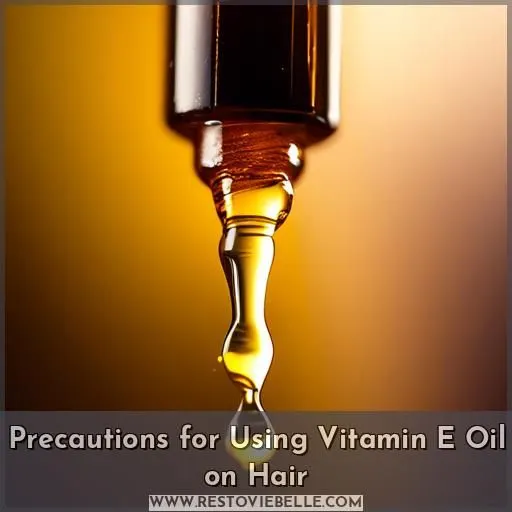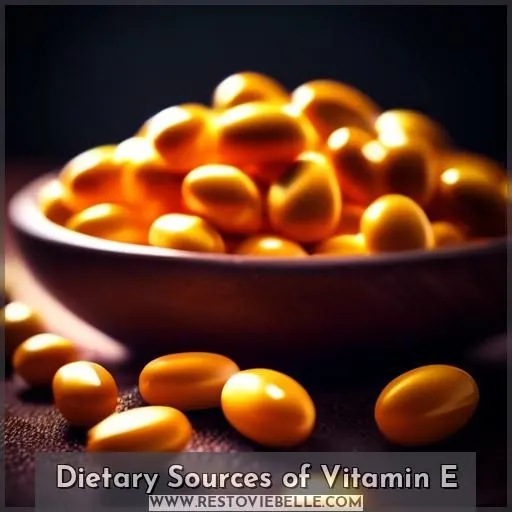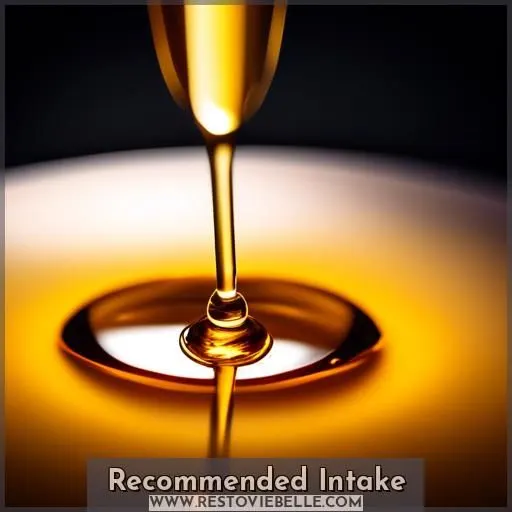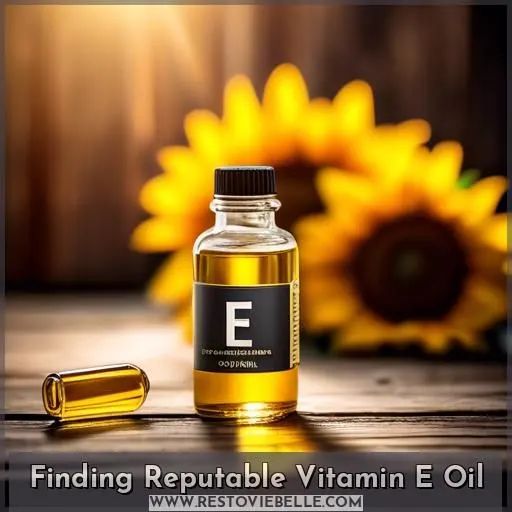This site is supported by our readers. We may earn a commission, at no cost to you, if you purchase through links.
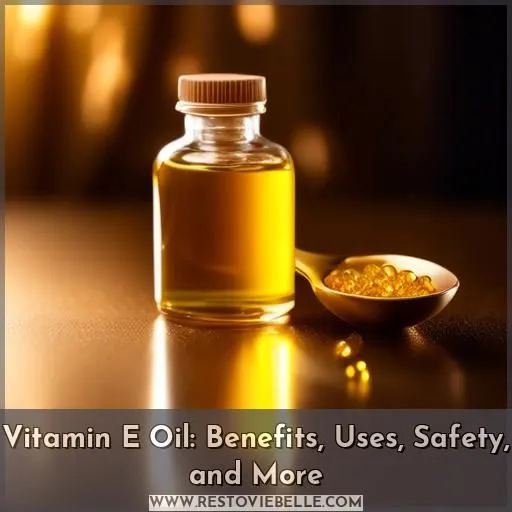
Vitamin E oil is a powerful antioxidant that can benefit your hair in numerous ways. It protects your hair from environmental stressors, promotes scalp health, and stimulates hair growth. Additionally, it prevents hair loss and adds shine while reducing frizz. Vitamin E oil is beneficial for all hair types, especially coarse, textured, or dry hair.
To use, dilute the vitamin E oil with a carrier oil, massage it into your scalp, and leave it in for an hour or overnight. Precautions include avoiding excessive use, potential allergic reactions, and high doses disrupting thyroid hormone production.
Other sources of vitamin E include almonds, sunflower seeds, green vegetables, and fortified foods. Always consult a healthcare provider before using any new hair care products or supplements.
Table Of Contents
- Key Takeaways
- Benefits of Vitamin E Oil for Hair
- Hair Type Considerations
- How to Use Vitamin E Oil for Hair
- Other Sources of Vitamin E for Hair
- Precautions for Using Vitamin E Oil on Hair
- Dietary Sources of Vitamin E
- Safety Precautions
- Recommended Intake
- Finding Reputable Vitamin E Oil
- Frequently Asked Questions (FAQs)
- What is the recommended daily intake of vitamin E for hair health?
- Can vitamin E oil be used for hair growth in conjunction with a balanced diet?
- How does vitamin E oil help prevent hair loss?
- What are the potential side effects of using vitamin E oil on the scalp?
- Can vitamin E oil be used in combination with other hair care products, such as shampoo and conditioner?
- Conclusion
Key Takeaways
- Vitamin E oil is a powerful antioxidant that can benefit hair in numerous ways, including protecting it from environmental stressors, promoting scalp health, and stimulating hair growth.
- It can be used for all hair types, especially coarse, textured, or dry hair, and can be diluted with a carrier oil for application.
- Precautions include avoiding excessive use, potential allergic reactions, and high doses that can disrupt thyroid hormone production.
- Other sources of vitamin E include almonds, sunflower seeds, green vegetables, and fortified foods.
Benefits of Vitamin E Oil for Hair
Are you looking for a natural way to boost your hair’s health and appearance? Consider incorporating vitamin E oil into your hair care routine. With its potent antioxidant properties, vitamin E oil can help protect your hair from environmental stressors, promote scalp health, and even stimulate hair growth.
Scalp rejuvenation
Boost your scalp health and rejuvenate your hair with vitamin E oil. This potent antioxidant protects your hair from damage, split ends, and hair loss. By stimulating hair growth and increasing shine, vitamin E oil is a must-have for anyone looking to improve their hair’s overall health and appearance.
Hair growth
Vitamin E oil is a powerful antioxidant that can support the balance of oil production in the scalp, which can lead to healthier hair follicles and potentially increased hair growth. By nourishing the hair from the inside out, vitamin E oil can support healthy scalp circulation, which is essential for hair growth.
Vitamin E oil also helps to reduce breakage by forming a protective barrier around individual hair strands, preventing external damage. Additionally, vitamin E oil can help to eliminate frizz and add shine to the hair, making it look healthier and more vibrant.
Prevents hair loss
Vitamin E oil is a potent antioxidant that protects your hair from damage, breakage, and split ends. It also promotes scalp health, improves circulation, and balances oil production. Here’s how to incorporate vitamin E oil into your hair care routine:
- Add a few drops to your shampoo or conditioner.
- Apply it as a leave-in treatment before styling.
- Use it as a natural detangler after washing your hair.
- Consume vitamin E oil-rich foods or take supplements for internal benefits.
Hair Type Considerations
When contemplating vitamin E oil for your hair, it’s imperative to acknowledge that all hair types can derive benefits, albeit the application method might differ. You’ll want to strike a balance between the oil’s nurturing properties and your hair’s specific requirements, thus avoiding excessive greasiness or discomfort.
Hair type considerations
Vitamin E oil can be beneficial for all hair types, especially coarse, textured, or dry hair. It can strengthen hair follicles, prevent hair breakage and split ends, and protect hair from damage. If you have brittle hair, consider using a hair mask or applying vitamin E oil as a leave-in treatment.
However, if your hair looks greasy after applying, it may be too much for your hair type. For those with oily hair, consider using a hair mask or diluting the oil before use.
If you’re considering vitamin E oil supplements, it’s best to consult with a doctor first. Alternatively, you can get the benefits of vitamin E for your hair by consuming vitamin E-rich foods or using shampoo and conditioner with vitamin E.
Application methods
Applying vitamin E oil to your hair can be a beneficial addition to your hair care routine. Here are some steps to help you apply the oil effectively:
- Choose the right frequency: Determine the ideal frequency for applying vitamin E oil to your hair based on your individual hair requirements. Generally, using the oil once or twice a week is recommended, but this may vary depending on your scalp’s exposure to stress factors like UV rays and pollution.
- Carrier oil recommendations: For better absorption and to enhance the effectiveness of vitamin E oil, mix it with a carrier oil like coconut, lavender, olive, or flaxseed oil.
- Treatment duration: Allow the oil to sit in your hair for an hour before rinsing it out, or you can leave it in overnight as long as you rinse it out the following morning.
- DIY recipes: You can create a DIY vitamin E oil serum by mixing a few drops of pure vitamin E oil with a couple of teaspoons of coconut oil. Warm up the mixture with your hands and massage it into your damp hair, leaving it on for about an hour before washing it off with cool water.
- Scalp massage: Massage the oil into your scalp, paying attention to massaging your scalp as it will improve oil absorption and overall blood circulation in the scalp.
- Shampoo and conditioner: Add a few drops of vitamin E oil to your shampoo or conditioner that doesn’t already contain vitamin E, ensuring an even distribution of the product.
- Vitamin E supplements: If you prefer, you can also take vitamin E supplements, but always consult your physician before starting any new supplement regimen.
Precautions and safety
When using vitamin E oil for hair, it’s essential to keep in mind possible interactions, side effects, toxicity, and overdose. While vitamin E oil is generally safe for hair, excessive use may lead to excess oil accumulation, resulting in dry flakes appearing on the scalp. Some people may experience an allergic reaction to the oil, which can present as skin irritation, redness, or swelling at the application site.
Additionally, high doses of vitamin E can disrupt thyroid hormone production, weaken bones, and increase the risk of prostate cancer. It’s also important to avoid taking high doses of vitamin E supplements, as they can be toxic in large doses and interact with certain medications, such as anticoagulants, other antioxidants, chemotherapy, or radiotherapy.
Always consult with a healthcare provider before using vitamin E oil for hair or taking supplements, and adhere to recommended dosages to avoid any potential risks.
How to Use Vitamin E Oil for Hair
Now that you comprehend how vitamin E oil can advantage your hair, let’s explore the most effective methods to integrate it into your routine. Utilizing vitamin E oil is effortless – merely adhere to these straightforward steps:
- Allow it to reside as an intensive conditioning treatment
- Blend it with your preferred conditioners or scalp treatments
- Employ it as the focal ingredient in an opulent hair mask
- Heat it for a restorative hot oil treatment
- Massage it directly into your scalp for concentrated care
The crux is to commence gradually and observe how your hair reacts. Through experimentation and observation, you’ll swiftly progress toward healthier, more radiant locks.
Other Sources of Vitamin E for Hair
Exploring the realm of Vitamin E for hair doesn’t mandate reliance solely on supplements.
Nature’s larder brims with Vitamin E-rich edibles that pamper your tresses.
Envision almonds and sunflower seeds as confidants, imparting wisdom for robust and radiant locks.
Moreover, let’s acknowledge the unsung champions, base oils such as wheat germ and safflower oil, which impart a liquid elixir to your crowning glory.
So, indulge your hair in the feast it yearns for!
Precautions for Using Vitamin E Oil on Hair
While exploring the benefits of Vitamin E for your mane, don’t let enthusiasm lead to a slippery slope of hair greasiness. A dab will do you – overdoing it can leave your locks looking limp.
If your scalp throws a fit with skin irritation, it’s time to dial back and reassess.
Dietary Sources of Vitamin E
To get the most from your vitamin E intake, it’s crucial to know how your body takes up this fat-soluble nutrient. Vitamin E is taken up more efficiently when taken with foods high in fat, such as oils or avocados. However, a recent study suggests that you don’t need to take fat with vitamin E at the same time to make sure proper absorption. You can wait up to 12 hours to take fat, and vitamin E will still be taken up into your body.
Here are some key points about vitamin E absorption:
- Vitamin E is fat-soluble, meaning it’s taken up better when taken with foods higher in fat.
- The time of taking fat doesn’t greatly affect vitamin E absorption.
- Vitamin E is taken up in the small intestine and kept there until enough fat is taken up to start the absorption process.
To get the most vitamin E absorption, focus on adding a variety of foods rich in vitamin E. These include nuts, seeds, green vegetables, and vegetable oils like wheat germ, sunflower, and safflower oils. Additionally, think about fortified foods like breakfast cereals and fruit juices, which may have added vitamin E.
Safety Precautions
When using vitamin E oil for hair, it’s crucial to take precautions to guarantee safety and bypass potential side effects. Here are some safety considerations to bear in mind:
- Overdosage and toxicity: Vitamin E oil can be toxic in large doses, and taking too much can lead to an increased risk of stroke, bleeding, and prostate cancer. Adhere to the recommended daily intake of 15 milligrams (22.4 IU) per day, and avoid taking more than 1,500 IU of natural-occurring vitamin E or 1,100 IU of synthetic vitamin E per day.
- Anticoagulants and interactions: Vitamin E oil can interact with anticoagulants (blood thinners) or antiplatelet medications, such as Jantoven (warfarin), and other antioxidants, like vitamin C, selenium, and beta-carotene. If you’re taking any medications, consult with a healthcare provider before using vitamin E oil to guarantee it’s safe for you.
- Chemotherapy or radiotherapy: Vitamin E oil may interact with chemotherapy or radiotherapy, so it’s crucial to consult with a healthcare provider before using it if you’re undergoing these treatments.
- Skin irritation: Some people may experience skin irritation or allergic reactions when using vitamin E oil, including itching and rash. Always do a patch test before using the oil on your hair, and if you notice any signs of irritation or allergic reaction, discontinue use.
- High doses: High doses of vitamin E can disrupt thyroid hormone production, weaken bones, and increase the risk of prostate cancer.
Recommended Intake
To safeguard the safety and efficacy of vitamin E oil, it’s essential to adhere to intake guidelines. Here are key considerations:
- Safety: Excessive vitamin E intake can be harmful and may interfere with thyroid hormone production, weaken bones, and elevate the risk of prostate cancer.
- Dosage: The daily recommended intake isn’t to exceed 1,500 IU of naturally occurring vitamin E or 1,100 IU of synthetic vitamin E.
- Deficiency: Insufficient vitamin E can result in skin and eye damage, muscle weakness, and weakened immune function.
Finding Reputable Vitamin E Oil
Regarding the selection of reliable vitamin E oil, multiple aspects should be taken into account. Firstly, seek products from well-established brands with a proven track record of excellence and safety. These may include brands endorsed by independent testing organizations such as Underwriters Laboratories (UL), NSF International, or ConsumerLab. Such accreditations guarantee that the product has been subjected to rigorous quality, purity, and safety assessments.
Transparency in ingredients is equally significant. Opt for vitamin E oils that comprise alpha-tocopherol and a carrier oil, such as extra virgin olive oil. A concise ingredient list is preferable, as certain vitamin E oils may contain superfluous additives that diminish the product’s purity.
Brand reputation is also paramount. Look for brands that garner favorable customer feedback and are renowned for manufacturing superior, efficacious products. This helps ensure that you acquire a product that meets your expectations.
To further ascertain product integrity, consider selecting vitamin E oils that are vegan, cruelty-free, and devoid of parabens, sulfates, and artificial fragrances. These products are frequently more natural and gentle on the skin, minimizing the risk of irritation or adverse reactions.
Frequently Asked Questions (FAQs)
What is the recommended daily intake of vitamin E for hair health?
The recommended daily intake of vitamin E for hair health is 15 milligrams (4 IU) per day. It’s essential to stick to this recommended amount to avoid potential side effects and interactions with certain medications.
Can vitamin E oil be used for hair growth in conjunction with a balanced diet?
Hitting two birds with one stone, using vitamin E oil for hair growth alongside a balanced diet can turbocharge your hair’s health, making it a lush, vibrant crown you’ll proudly wear.
How does vitamin E oil help prevent hair loss?
Vitamin E oil helps prevent hair loss by reducing oxidative stress in the scalp. This antioxidant property helps protect hair follicles from damage and potential hair loss. Additionally, vitamin E oil can increase blood circulation to the scalp, which aids in overall hair growth.
What are the potential side effects of using vitamin E oil on the scalp?
Potential side effects of using vitamin E oil on the scalp include allergic reactions, acne or breakouts, greasy hair, and interactions with certain medications or other antioxidants. It’s essential to follow the recommended dosage and frequency of use to avoid these side effects.
Can vitamin E oil be used in combination with other hair care products, such as shampoo and conditioner?
Yes, vitamin E oil can be used in combination with other hair care products, such as shampoo and conditioner. Many hair care products are fortified with vitamin E as an active ingredient, providing moisturizing benefits and promoting hair growth. You can also add a few drops of vitamin E oil to your shampoo or conditioner, or use it as a leave-in treatment after washing your hair.
It’s recommended to start with a small amount and gradually increase the frequency of use to check for any potential irritation or sensitivity.
Conclusion
Why not bestow upon your hair the sustenance it rightfully demands with vitamin E oil? This formidable antioxidant possesses the capability to revitalize your scalp, foster hair growth, and thwart hair loss, rendering it a multifaceted remedy for all hair types.
Bear in mind that temperance is paramount, and it’s imperative to dilute it with a carrier oil to ensure safe application.
Through the incorporation of vitamin E oil into your hair care regimen and the pursuit of dietary sources, you’ll take a substantial stride towards achieving healthier, more radiant hair.
